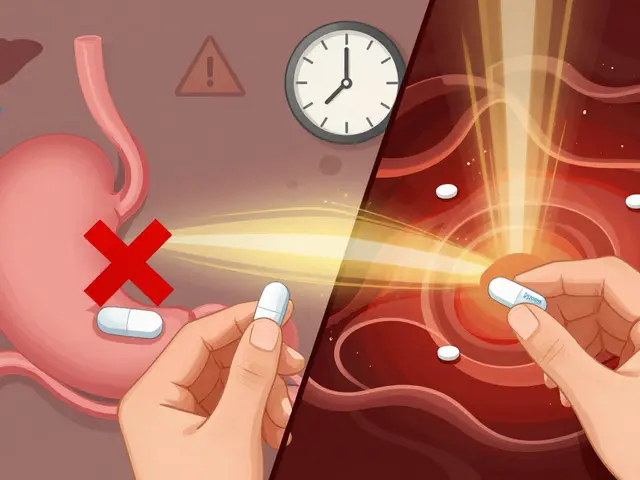Gastroenteritis: Causes, Symptoms and Fast Home Care
Gastroenteritis — often called the stomach flu — can knock you out for a day or two, or become seriously dangerous for babies and older adults. It usually shows up as sudden diarrhea, vomiting, stomach cramps, and sometimes fever. Most cases are viral (norovirus, rotavirus), but bacteria and parasites can also cause it. Knowing what to do fast reduces complications and stops the bug from spreading.
Fast, practical steps you can take at home
First priority: prevent dehydration. If you’re throwing up or having lots of watery stools, drink small, frequent sips. Oral rehydration solution (ORS) is best — you can buy it or make a simple mix: 1 liter of water, 6 teaspoons sugar, and 1/2 teaspoon salt. Avoid plain fruit juices and sodas for rehydration; they can make diarrhea worse.
When vomiting, try ice chips or teaspoon sips every few minutes until steady. Once you tolerate liquids, move slowly to bland foods: toast, rice, bananas, applesauce — not greasy or spicy meals. Rest and avoid alcohol.
Over-the-counter options: loperamide (Imodium) can reduce diarrhea in adults who are otherwise well, but don’t use it if you have bloody stools or a high fever. Bismuth subsalicylate (Pepto-Bismol) helps some adults with nausea and diarrhea but avoid it in children and teens after viral illness. If medications confuse you, call a clinician or check our site guides for safe online pharmacy options.
Red flags — when to call a doctor or go to the ER
Most adults recover in 48–72 hours. Seek urgent care if you or someone you care for has: signs of dehydration (dizziness, very low urine output, dry mouth, sunken eyes), bloody diarrhea or black stool, severe belly pain, persistent high fever, or repeated vomiting that prevents keeping liquids down. Infants, people over 65, pregnant people, and anyone with a weakened immune system should get medical advice early.
If symptoms follow recent antibiotic use, mention that to your provider — it could be Clostridioides difficile, which needs specific testing and treatment. For medication-related stomach problems, see our article “Rifampin and Stomach Issues” for tips on managing side effects.
Prevention matters. Wash hands thoroughly after toilet use and before food prep, disinfect surfaces, avoid sharing utensils, and stay home while sick. For norovirus you should remain extra cautious: people can still spread it for 48–72 hours after symptoms stop.
Want help finding affordable meds or reading labels? Our site covers safe online pharmacies, cost-saving tips, and how to buy prescriptions responsibly. If in doubt about symptoms or taking medicines, call your healthcare provider — quick action prevents small stomach bugs from turning into big problems.

Effective Fiber Use for Gastroenteritis Recovery and Prevention
Fiber is an essential component in both recovering from and preventing gastroenteritis. It can help regulate digestion, improve gut health, and support the immune system. Incorporating the right types of fiber from foods like fruits, vegetables, and whole grains can alleviate symptoms and reduce the risk of future episodes. Understanding how fiber works in the digestive system is crucial for managing and preventing gastroenteritis. This article explores the vital role of fiber and offers practical tips for integrating it into your diet.
View More




